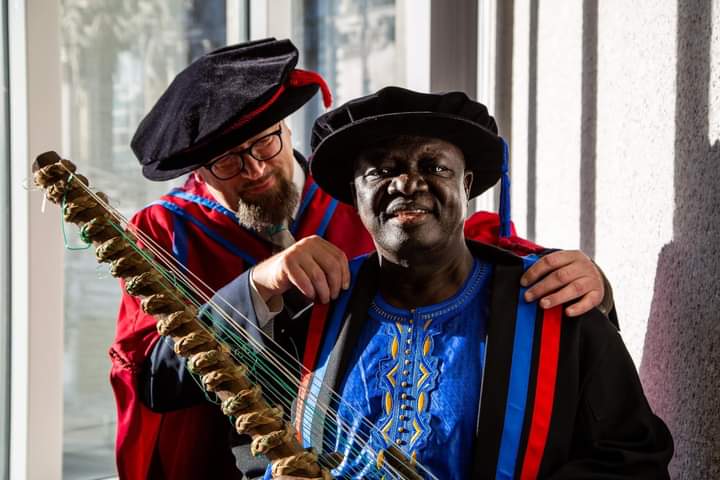
“If you want to count every part of your body, you will end up insulting yourself.” Fina Dahaba
Kairo Radio is today delighted to have Nuha Dabo of Kambeng FM in Casamance, Senegal, as the anchor of Natariko program. Dabo, himself a history guru, had a lengthy, educative and wisdom-loaded chat with the 96-year-old legendary and reputable cultural historian. Al-Amin Dahaba [affectionately called Fina Dahaba] is a rare gift to any society. The aged Bard is among a few living historians who lived through the colonial rule in the Senegambia region. He is equally a scholar of Islamic tradition of the Senegambia.
Nuha and Fina talked about events under colonial rule in Senegambia, and how our old societies operate. This epic discussion is one that we should not miss because we have been so consumed by globalisation and materialism that we have lost our ways. We also forget who we are.
Fina Dahaba said tribes in the subregion have so many connections. He talked about how Mandinka words pronounced differently in Serere, Balanta etc. Fina explains the warlords who fought for the Jihadist Foday Kabba Dumbuya, among them (Nfamara Manneh, Nfansu Soma, Senku Sanneh, Tamsir Conta, Mamba Bayo, Kuru Sonko, Demba Hajada, Jalamang, Bamba Kinteh and many other Kabunkas. The narratives also highlight the life of Balanba, the history of the Sufi marabout households and many more.
Fina Dahaba also explained the journey of Nghalen Sonko, his encounter with Nyor Mamdara king, Hamaba Jatta. He succinctly put to rest the false narrative that, the battle between Futa and Kabou was a religious war. “It wasn’t because there were Muslim inhabitants under Janky Wally’s rule. The war was territorial and revenge for the Sarahuleh’s whose fortress was destroyed, and capture of their countless inhabitants,” Dahaba said.
With a minimal cost, people can get CD copies of the program.
Some powerful quotes by Fina Dahaba
“Who do you choose: a person who refuses to pray or one who refuses to work? Choose the one who does not pray because each soul will bear his/her action, whilst a lazy person becomes a liability on you.”
“The war between Futa and Kabou was not cause by religious conversion or women issues as some state.”
“Not all two fives is equal to ten, how is that possible?” Fina Dahaba.
“kini-natila” (kintanwo) Someone who carries the food to male camp.
Sanawo (sanari-nyo-joking relative) Dankuto (dan-ku-to- jovial inter-family name relationship) know where to stop in conversation.
“You may pray God give you goodness, wealth, and fortune, but then ill health and sickness destroy goodness; it is better to pray and work towards good health, then the seeker want to pray for fame. The wise man said it is better to seek for ‘sutura’ concealment from want and exposure and fame because people will soon talk about you. They will harbour hatred against you.
“People think death is the spoiler of pleasure’, but then without death, there will not any enjoyment because the meat we eat are from the carcass of animals, dead fish, cows, sheep etc, some men cannot even have certain women if the husbands don’t die, so death is a permanent state of affairs which brings sorrow and pleasure. The heart enjoys meat which comes from a dead animal.”
Tune in to the facts and stories of our past. Hopefully you will learn something from our ancient philosophies. We will bring you the early life of war hero Almamy Samori Toure in our next week program.
Ends



Yerro Ba
The Futa/Kabou war is a controversial one. It depends on who makes the narration. However i am inclined to side with Historian Fina that wars are not waged on religious grounds but religion has always been used as a pretext to wage war. Even the present wars in the Arabia including ISIS and Baka Haram are nothing but pretexts. If one studies beneath the surface it will become clear that they are mainly political and economic rather than anything else. On that score i would give Fina a thumps up.
karamo
Many thanks again kairo radio..